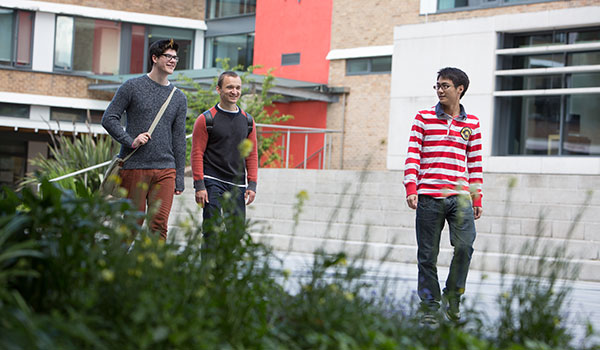Linguistics BA Hons
Our Linguistics degree allows you to explore the phenomenon of language, focusing on the sound, grammar and meaning systems of different languages.

As one of the largest departments of Linguistics in the UK, we offer a range of BA (Hons) degrees across the fields of English Language and Linguistics.
Our Linguistics degree allows you to explore the phenomenon of language, focusing on the sound, grammar and meaning systems of different languages.

Our English Language degree gives you the opportunity to learn about the structure, history and uses of the English Language.

Our combined degree in Linguistics and English Language gives you the best of both worlds.

Discover the fascinating science of language – from how children acquire language skills to how machines comprehend and produce language.

We offer degrees in Linguistics, English Language, and Language Sciences. Which programme is right for you depends on your interests.
Our Linguistics degree is focussed on general principles of language, including its properties, development, variation and use.
Our English Language degree focusses on how these issues relate to English in particular, including the sounds and structures of English, its history, its regional and global varieties, and its use in areas like politics, the media, and advertising.
Discover the fascinating science of language – from how children acquire language skills to how machines comprehend and produce language.
Our combined degree Linguistics and English Language gives you the best of both worlds.
The Department has some outstanding resources. We have fully equipped laboratories for eye-tracking, phonetics, EEG (Electroencephalography) and child language analysis.

A degree in English Language or Linguistics equips individuals in a range of skills that set them up for vibrant and exciting careers.

All second and third year Linguistics and English Language undergraduates can apply for paid research internships


We offer a wide range of interesting study-abroad opportunities for undergraduate students who wish to spend a year studying abroad. Credits obtained at a foreign university count towards your Lancaster degree.
We also welcome visiting or exchange students, whether taking courses for one term or longer. You must have completed a year of study at your home university before coming to Lancaster.
Study AbroadGet to know some members of our staff. In the videos they give brief insights into their research interests and teaching.
Dr Sam Kirkham discusses articulatory phonetics, demonstrating how ultrasound technology allows us to observe the dance of the tongue during speech production.
Professor Claire Nance discusses sounds of the world’s languages using ‘r’ as an example, which articulatorily complex and varies in its articulation across different languages.
Professor Christopher Hart discusses linguistic relativity and the language of Tzeltal, which describes object locations as uphill, downhill or across the hill rather than using words for left and right.
Dr George Brown discusses computational linguistics and its contributions to speech technology including text-to-speech conversion and AI.
Dr Claire Hardaker discusses forensic linguistics and the different tasks that forensics linguists perform for the police, including authorship analysis and profiling.
More Events